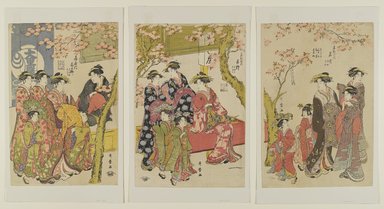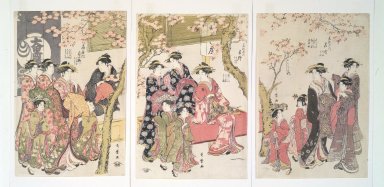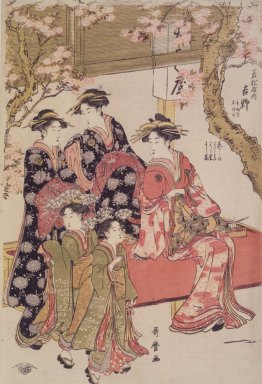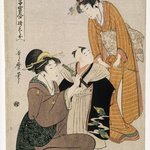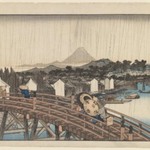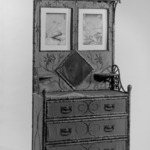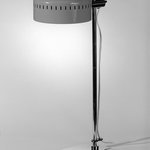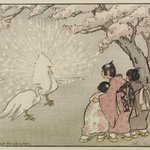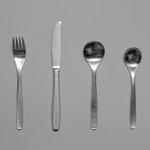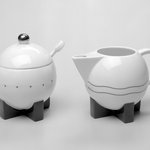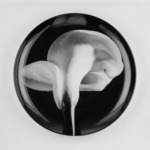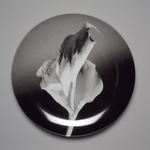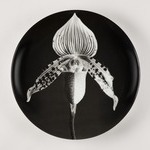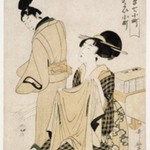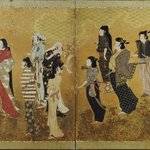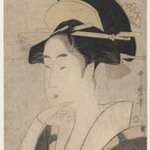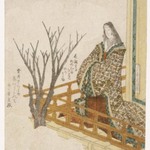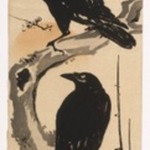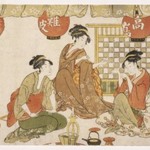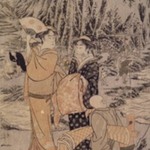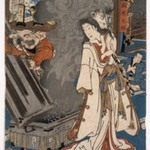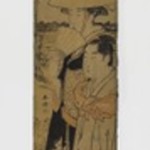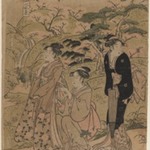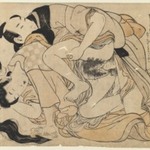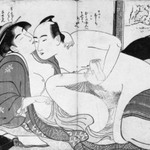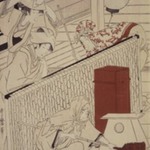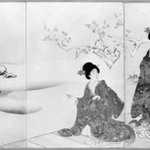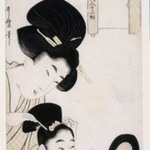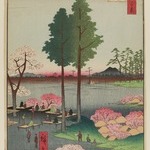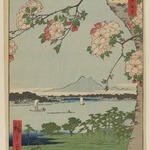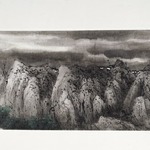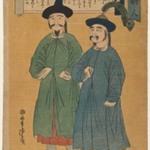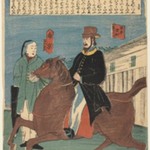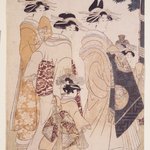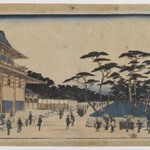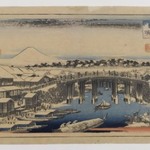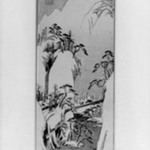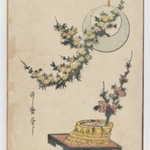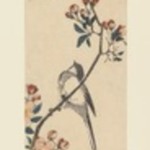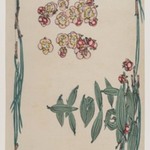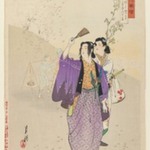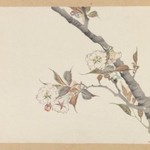Courtesans Strolling Beneath Cherry Trees Before the Daikokuya Teahouse
Kitagawa Utamaro
Asian Art
Kitagawa Utamaro is known primarily for his images of beautiful women. This trio of prints is unusual because the artist names all of his subjects. The extravagantly dressed women are courtesans, indicated by their obi sashes tied at the front. (Women who are not in the sex trade—including the geishas who provide non-sexual entertainment at parties—tie their obis at the back.) Accompanied by child attendants, they admire the blossoming cherry trees that were transplanted to the entertainment district each spring. The colors in this triptych are remarkably well preserved: the dyes Utamaro used for light blue and lavender are very susceptible to fading and have turned gray in most other examples.
MEDIUM
Woodblock print, color on paper
DATES
probably 1789
PERIOD
Edo Period
DIMENSIONS
15 3/8 x 10 3/8 in. (39.1 x 26.4 cm)
(show scale)
MARKINGS
Publisher: Tsutaya Jūzaburō (Kōshodō)
SIGNATURE
Utamaro ga 歌麿画
INSCRIPTIONS
Figures identified by inscription on each page:
Left:
Kasugano of the Ogiya (main courtesan) with child attendants (kamuro) Wakana and Kocho, apprentices Harusono, Harukinu, Harukaze, and Harukusa.
Middle:
Yoshino of the Wakamatsuya (main courtesan) with child attendants Momiji and Shigeno, apprentices Mikishino, Yoshitaka, Yoshisato, and Yoshitomi
Right:
Nabiki of the Wakamatsuya (main courtesan) with child attendants Takeji and Kikuji, apprentices Ninae, Hanasumi, Nanasato, and Nanahime.
(Reading is courtesy of Museum of Fine Arts, Boston. Unclear how to read it because there are only 2 apprentices in the center and right pages, but more names listed)
ACCESSION NUMBER
1995.137a-c
CREDIT LINE
Gift of the Estate of Charles A. Brandon, by exchange; purchased with funds given by Mr. and Mrs. Richard M. Danziger, Joan Easton, Mrs. Myron S. Falk, Jr., George S. Friedman, Mr. and Mrs. Mark Kingdon, Klaus F. Naumann, Robert Rosenkranz, and Mr. and Mrs. David Young and Asian Art Acquisition Fund
CATALOGUE DESCRIPTION
Oban tate-e triptych, woodblock print, color on paper. Three courtesans and their kamuro (child attendants) and shinzo (apprentices), identified by inscription, from right: Nabiki (Wakamatsuya), Yoshino (also fo the Wakamatsuya), and Kasugano (Ogiya), at the Daikokuya Teahouse, which had moved from Nakanocho to Ageyacho after the great 1787 fire, and apparently reopened in the spring of 1789, an event which is suggested by Prof. Asano Shugo (Chiba City Museum, Chiba City, Japan) to be celebrated by this design (see Utamaro, 1995, p. 57). Asano (conversation with A. Poster, 4/27/96) feels now that there may be five prints (making the design a pentaptych). Other versions are in the MFA, Boston, and Worcester Art Museum. No complete pentaptych survives.
The three sumptuously attired courtesans and their attendants are specifically identified. In the right-hand sheet, a tanzaku sheet hangs from the branches of the cherry tree with a poem by Yadoya Meshimori (1753-1830), later known as Rokujuen, founder of the Go-kawa poetry group and an important figure in the kyoka poetry movement.
Condition: Very good. Note keyblock lines and two tiny wormholes in each sheet. For extensive report, see Conservator's Report, 11/6/95. As of 5/6/96: Three sheets are matted separately and located in P&D storage, Sh. 10, Box 3G (Size 1 mats).
MUSEUM LOCATION
This item is not on view
CAPTION
Kitagawa Utamaro (Japanese, 1753–1806). Courtesans Strolling Beneath Cherry Trees Before the Daikokuya Teahouse, probably 1789. Woodblock print, color on paper, 15 3/8 x 10 3/8 in. (39.1 x 26.4 cm). Brooklyn Museum, Gift of the Estate of Charles A. Brandon, by exchange; purchased with funds given by Mr. and Mrs. Richard M. Danziger, Joan Easton, Mrs. Myron S. Falk, Jr., George S. Friedman, Mr. and Mrs. Mark Kingdon, Klaus F. Naumann, Robert Rosenkranz, and Mr. and Mrs. David Young and Asian Art Acquisition Fund, 1995.137a-c (Photo: Brooklyn Museum, 1995.137a-c_PS4.jpg)
IMAGE
overall, 1995.137a-c_PS4.jpg. Brooklyn Museum photograph, 2016
"CUR" at the beginning of an image file name means that the image was created by a curatorial staff member. These study images may be digital point-and-shoot photographs, when we don\'t yet have high-quality studio photography, or they may be scans of older negatives, slides, or photographic prints, providing historical documentation of the object.
RIGHTS STATEMENT
No known copyright restrictions
This work may be in the public domain in the United States. Works created by United States and non-United States nationals published prior to 1923 are in the public domain, subject to the terms of any applicable treaty or agreement.
You may download and use Brooklyn Museum images of this work. Please include caption information from this page and credit the Brooklyn Museum. If you need a high resolution file, please fill out our online
application form (charges apply).
The Museum does not warrant that the use of this work will not infringe on the rights of third parties, such as artists or artists' heirs holding the rights to the work. It is your responsibility to determine and satisfy copyright or other use restrictions before copying, transmitting, or making other use of protected items beyond that allowed by "fair use," as such term is understood under the United States Copyright Act.
The Brooklyn Museum makes no representations or warranties with respect to the application or terms of any international agreement governing copyright protection in the United States for works created by foreign nationals.
For further information about copyright, we recommend resources at the
United States Library of Congress,
Cornell University,
Copyright and Cultural Institutions: Guidelines for U.S. Libraries, Archives, and Museums, and
Copyright Watch.
For more information about the Museum's rights project, including how rights types are assigned, please see our
blog posts on copyright.
If you have any information regarding this work and rights to it, please contact
copyright@brooklynmuseum.org.
RECORD COMPLETENESS
Not every record you will find here is complete. More information is available for some works than for others, and some entries have been updated more recently. Records are frequently reviewed and revised, and
we welcome any additional information you might have.
